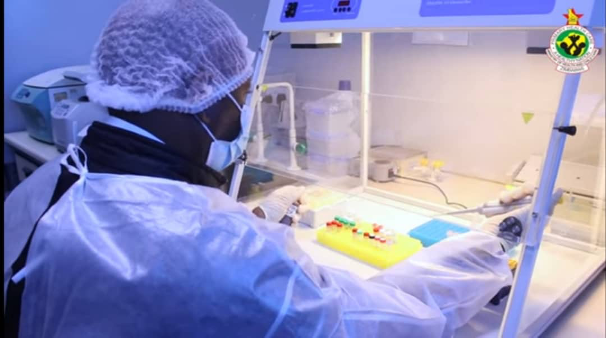In the face of the global health crisis posed by the COVID-19 pandemic, the Elizabeth Glaser Pediatric AIDS Foundation (EGPAF) in Zimbabwe demonstrated its commitment to improving laboratory systems to strengthen COVID-19 testing. In 2021, EGPAF-Zimbabwe implemented the Catalyzing COVID-19 Action (CCA) project, funded by FIND and Unitaid. This project supported testing, genetic sequencing, and building laboratory capacity.
EGPAF’s approach was rooted in understanding the unique challenges faced by laboratories in Zimbabwe. Through assessments, EGPAF identified critical gaps and areas for improvement. This allowed EGPAF to provide tailored technical assistance that addressed specific needs, ensuring a sustainable and impactful intervention.
At the beginning of the pandemic, the EGPAF CCA team swiftly moved to support the Center of Excellence laboratory with 1,000 tests of semi-quantitative rapid C-reactive protein testing reagents. The laboratory was able to use alternative reagents instead of the pricey Beckman Chemistry reagents.
EGPAF’s continuous support to conduct genetic sequencing of COVID-19 samples is a testament to its contribution to the global effort against the pandemic’s evolving challenges. SARS CoV-2 genetic sequencing relied on testing residual samples left over after PCR testing. Due to transportation delays from PCR labs, the fact that viral testing left no residual samples, the national surveillance system was unable to achieve sequencing rates fast enough to detect and track new variants and/or assist the development of new mRNA-based vaccines.
In Zimbabwe, 80% of testing was happening on antigen testing platforms, which meant no residual sample was available for genetic sequencing. The EGPAF CCA team addressed the issue by distributing commodities for viral transportation media to antigen testing sites so that they could collect swab from all SARS CoV-2 antigen-positive clients and forward them to the sequencing laboratory to support the timely national tracking of SARS CoV-2 variants in circulation.
Another cornerstone of EGPAF’s success was its emphasis on laboratory capacity-building. EGPAF conducted more than 20 on-site comprehensive training programs for laboratory technicians in Harare.
EGPAF forged a partnership with the Medical Laboratory and Clinical Scientists Council, the Ministry of Health and Childcare Infection Prevention and Control department, and the National Microbiology Reference Laboratory (NMRL) to transfer essential knowledge and skills to Zimbabwean lab technicians. These training workshops covered a wide spectrum; from biosafety and biosecurity to best practices in sample collection and handling, to advanced molecular techniques for accurate COVID-19 testing—in both public and private laboratory settings. By empowering laboratory technicians, EGPAF-Zimbabwe not only improved the quality of testing but also contributed to skill development and knowledge-sharing within the country.
In March 2023, the Lab Services Department in the Ministry of Health sent a request to EGPAF-Zimbabwe to support them in refresher training and direct service delivery to provide COVID-19 screening and testing to the President’s Office. Key officials from the Judicial Services Commission and delegates attended the official opening of the Epworth Magistrates Court, officiated by Zimbabwe’s President. The government trusted EGPAF to support COVID-19 screening and testing, honoring its commitment to public health and position as an expert in pandemic response initiatives.
The strengthened laboratory systems laid the groundwork for improved surveillance of future public health threats such as cholera, influenza, and other pathogens. Lessons learned from the CCA project were documented in the National Microbiology Reference Laboratory (NMRL) quarterly reports for future reference.
In conclusion, EGPAF’s collaboration with Zimbabwean laboratories exemplified our organization’s commitment to global health, even in the face of unprecedented challenges. EGPAF’s success in Zimbabwe not only empowered Zimbabwe to respond effectively to the pandemic, but has left a lasting positive impact on the country’s laboratory system.




